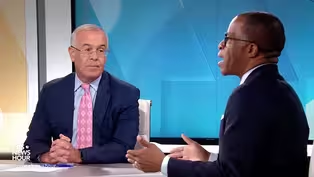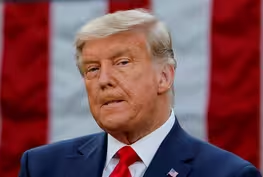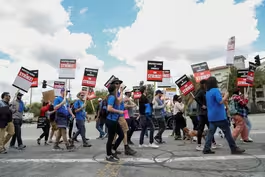
GOP candidates avoid climate change on campaign trail
Clip: 8/4/2023 | 7m 15sVideo has Closed Captions
GOP presidential candidates avoid discussing climate change on campaign trail
The 2024 Republican presidential campaign season is in full swing and candidates are stumping on a host of key issues. But one topic that’s missing from their agenda is climate change. Despite a summer of record-setting heat, new polling shows that Republican voters still don't see a warming planet as a concern. As William Brangham reports, neither do the GOP candidates who want to lead them.
Problems playing video? | Closed Captioning Feedback
Problems playing video? | Closed Captioning Feedback
Major corporate funding for the PBS News Hour is provided by BDO, BNSF, Consumer Cellular, American Cruise Lines, and Raymond James. Funding for the PBS NewsHour Weekend is provided by...

GOP candidates avoid climate change on campaign trail
Clip: 8/4/2023 | 7m 15sVideo has Closed Captions
The 2024 Republican presidential campaign season is in full swing and candidates are stumping on a host of key issues. But one topic that’s missing from their agenda is climate change. Despite a summer of record-setting heat, new polling shows that Republican voters still don't see a warming planet as a concern. As William Brangham reports, neither do the GOP candidates who want to lead them.
Problems playing video? | Closed Captioning Feedback
How to Watch PBS News Hour
PBS News Hour is available to stream on pbs.org and the free PBS App, available on iPhone, Apple TV, Android TV, Android smartphones, Amazon Fire TV, Amazon Fire Tablet, Roku, Samsung Smart TV, and Vizio.
Providing Support for PBS.org
Learn Moreabout PBS online sponsorshipAMNA NAWAZ: The 2024 Republican presidential campaign season is in full swing, and candidates are stomping on a host of key issues, but one that's missing from their agenda, climate change.
Despite a summer of record-setting heat, new polling shows that Republican voters still don't see a warming planet as a concern.
As William Brangham reports, neither do the Republican candidates who want to lead them.
CHUCK TODD, Moderator, "Meet The Press": Heat waves and wildfire.
MAN: A major heat wave.
They will likely hit 100 degrees today or tomorrow.
MAN: We're seeing Central Park today.
Glowing orange isn't good.
WILLIAM BRANGHAM: This summer, smoke from Canadian wildfires cast a dystopian yellow haze over U.S. cities.
The drought-stricken Colorado River forced seventh Southwestern states to consider drastic water cuts.
A blistering heat wave punished millions of Americans.
The disparate impacts of our warming world were impossible to miss.
But out on the campaign trail, Republican candidates are talking about everything but climate change.
GOV.
RON DESANTIS (R-FL), Presidential Candidate: We're going to end the woke agenda.
VIVEK RAMASWAMY (R), Presidential Candidate: An open border is not a border.
MIKE PENCE (R), Presidential Candidate: It's the worst inflation in 40 years.
WILLIAM BRANGHAM: The Republican silence on climate change is echoed in recent polling, which shows Republican voters also don't see it as a concern.
In a new "PBS NewsHour"/NPR/Marist poll, while 56 percent of Americans think climate change is a major threat, only 28 percent of Republicans do.
A third of Republicans say it's a minor threat.
And another third say it's no threat at all.
LISA FRIEDMAN, The New York Times: To talk about climate change remains very difficult for a number of conservative lawmakers, who feel that their constituents are themselves either apathetic or antagonistic to it.
WILLIAM BRANGHAM: Lisa Friedman covers climate and environmental policy for The New York Times.
She says this trend comes even as some Republican leaders have shifted to acknowledge the scientific consensus on what's driving climate change.
LISA FRIEDMAN: Overwhelmingly, Republican leadership acknowledges that climate change is happening, that it is driven, in their view, at least, in part by fossil fuels.
The deep division is over what to do with it.
MIKE PENCE: Well, let me just say that, clearly, the climate is changing, not as dramatically as the radical environmentalists like to present.
WILLIAM BRANGHAM: Most Republicans reject the single biggest way to cut the emissions that are driving climate change, to shift away from burning fossil fuels and transition to renewable power, like solar, wind, hydropower, and geothermal.
VIVEK RAMASWAMY: Fossil fuels are a requirement for human prosperity.
WILLIAM BRANGHAM: What's more, many Republicans pledge to roll back the Biden administration signature climate initiative, the Inflation Reduction Act, which directs billions of dollars in subsidies and incentives to deploy those technologies.
LISA FRIEDMAN: What you hear often from conservatives is that we can address climate change, we can address the emissions from fossil fuels without reducing the fossil fuels themselves.
That is not the way scientists see it.
Scientists have said over and over again, that, in order to reduce emissions, we need to convert to renewable energy and reduce the burning of fossil fuels altogether.
WILLIAM BRANGHAM: The leading Republican in the race, former President Donald Trump, is also the most ardent denier of the reality of climate change.
DONALD TRUMP, Former President of the United States: The environmentalists talk about all this nonsense.
LEAH STOKES, University of California, Santa Barbara: Donald Trump is a climate denier.
He has consistently cast doubt on climate science.
He says that it's a hoax.
WILLIAM BRANGHAM: Political scientists Leah Stokes researches energy and climate policy.
LEAH STOKES: Under his administration, there was a massive gutting of bedrock environmental agencies, like the Environmental Protection Agency, and rolling back hundreds of environmental regulations.
GOV.
RON DESANTIS (R-FL), Presidential Candidate: Hello, Iowa!
WILLIAM BRANGHAM: Other leading Republicans, like Florida Governor Ron DeSantis, have also dismissed the issue as an exaggerated left-wing talking point.
GOV.
RON DESANTIS: I have always rejected the politicization of the weather.
WILLIAM BRANGHAM: Florida often suffers from disasters that are made worse by climate change.
Since 2020, 16 major storms have caused over $100 billion in damage to the state, sending insurance rates through the roof and some insurance companies out of state.
Despite his rhetoric, DeSantis has implemented programs to address these disasters.
LISA FRIEDMAN: On the ground, he has taken steps to protect Florida against stronger storms, against rising sea levels.
I think what you're seeing is also common among many Republicans in areas deeply threatened by climate change, is a resistance to push on fossil fuels, but a very much of an openness and a willingness to address what we call adaptation, protecting areas against the consequences of climate change.
WILLIAM BRANGHAM: Critics argue a main reason why Republicans resist any limits on fossil fuels is campaign money.
According to the money tracking group Open Secrets, the top 20 oil, coal and gas donors gave out over $80 million in campaign contributions in the last two years.
That money went almost exclusively to Republicans and conservative groups.
LEAH STOKES: The problem is that the fossil fuel industry has increasingly bought and paid for huge swathes of Republican Party politicians, whether that's in Congress or in statehouses or sometimes in the White House.
WILLIAM BRANGHAM: A conservative think tank, the Heritage Foundation, has drafted a detailed climate and energy plan called Project 2025 for the next Republican president.
Its sweeping reforms would cut nearly all of the federal government's current climate work, blunt the use of renewable energy and cut current regulations on the fossil fuel industry.
Mandy Gunasekara is with the Heritage Foundation and was formerly chief of staff at the Environmental Protection Agency during the Trump administration.
She helped write the section on the EPA.
MANDY GUNASEKARA, Heritage Foundation: The Republican Party understands that climate change is a serious issue that needs to be addressed, now needs to be addressed through balanced regulations and investing in solutions that will actually make a difference.
It should not be used as a means to justify expanded control of the federal government.
LEAH STOKES: It's unconscionable.
It would be like being in a global pandemic and deciding that the thing you needed to do was fire all of the doctors and nurses.
That's basically what the conservative Republican plan is if they take the White House in 2025.
WILLIAM BRANGHAM: Across the globe, this July was the hottest month on record, yet another indicator of the increasingly harsh reality of present-day climate change.
But the political schism in America over what to do about it continues.
For the "PBS "NewsHour," I'm William Brangham.
Brooks and Capehart on Trump's latest indictment
Video has Closed Captions
Clip: 8/4/2023 | 10m 10s | Brooks and Capehart on Trump's latest indictment and climate politics (10m 10s)
Job report falls short but shows recession might be avoided
Video has Closed Captions
Clip: 8/4/2023 | 4m 20s | Jobs report falls short of expectations but signals recession might be avoided (4m 20s)
Lessons learned from COVID prepare world for future threats
Video has Closed Captions
Clip: 8/4/2023 | 7m 45s | How lessons learned from COVID are preparing the world for future health threats (7m 45s)
News Wrap: Trump enters plea on new charges in document case
Video has Closed Captions
Clip: 8/4/2023 | 4m 41s | News Wrap: Trump enters plea on additional charges in classified documents case (4m 41s)
Studios, writers return to negotiations after 3 months
Video has Closed Captions
Clip: 8/4/2023 | 6m 34s | Studios and writers return to contract negotiations for first time in 3 months (6m 34s)
U.S. company Haas appears to supply Russian arms industry
Video has Closed Captions
Clip: 8/4/2023 | 10m 2s | U.S. company Haas appears to still indirectly supply Russian arms industry with technology (10m 2s)
Providing Support for PBS.org
Learn Moreabout PBS online sponsorship
- News and Public Affairs

FRONTLINE is investigative journalism that questions, explains and changes our world.

- News and Public Affairs

Amanpour and Company features conversations with leaders and decision makers.












Support for PBS provided by:
Major corporate funding for the PBS News Hour is provided by BDO, BNSF, Consumer Cellular, American Cruise Lines, and Raymond James. Funding for the PBS NewsHour Weekend is provided by...





